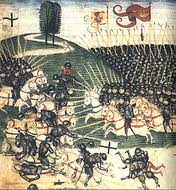The Turning Point in the Battle of Tannenberg (Grunwald/Žalgiris) in 1410
Ekdahl, Sven
LITHUANIAN QUARTERLY JOURNAL OF ARTS AND SCIENCES,Volume 56, No.2 – Summer (2010)
Abstract
This article acquaints the reader with a crucial letter from the Middle Ages, one that has changed the interpretation of the history of Lithuania on an essential point. It refers to the famous battle of Žalgiris in 1410 and the role of the Lithuanian army under the command of Grand Duke Vytautas. In the following, I will use the term “Tannenberg” for that battle because it is the most common one in English usage, and not the Lithuanian “Žalgiris” or the Polish term “Grunwald.”
In July 2005, a renowned German publishing house offered a new book on the history of the Teutonic Order, written by a German professor of Medieval History.2 The author is well known for his accuracy and scholarly approach to the various issues concerning the Teutonic Order, not only in Prussia and Livonia, but also in the bailiwicks of the Holy Roman Empire and the Mediterranean region. In the chapter dealing with the Battle of Tannenberg, fought on 15 July 1410, and the serious consequences that ensued from the disastrous defeat of the Teutonic Order, the turning point in that battle is described in the following way:
In this situation, the commanders of the Order made another blunder, which was decisive for the further course of the battle. They did not realize that the Lithuanian troops, among which also Russians and Tartars were also fighting, had made a tactical retreat. When the knight-brothers pursued their seemingly fleeing enemies, they ripped a gap in their own battle array into which Polish units penetrated and overran the left wing of the Order’s troops.
This presentation in a solid and serious book gives evidence of the acceptance of the new view of what happened during the Battle of Tannenberg, asserting that the Lithuanian forces under the command of Grand Duke Vytautas did not flee in cowardly fashion from the battlefield, as told in old Polish chronicles, but used the tactics of a feigned retreat to bring disorder in the enemies’ ranks, and thus decisively contribute to the defeat of the Teutonic Order’s army.
The Turning Point in the Battle of Tannenberg (Grunwald/Žalgiris) in 1410
Ekdahl, Sven
LITHUANIAN QUARTERLY JOURNAL OF ARTS AND SCIENCES,Volume 56, No.2 – Summer (2010)
Abstract
This article acquaints the reader with a crucial letter from the Middle Ages, one that has changed the interpretation of the history of Lithuania on an essential point. It refers to the famous battle of Žalgiris in 1410 and the role of the Lithuanian army under the command of Grand Duke Vytautas. In the following, I will use the term “Tannenberg” for that battle because it is the most common one in English usage, and not the Lithuanian “Žalgiris” or the Polish term “Grunwald.”
In July 2005, a renowned German publishing house offered a new book on the history of the Teutonic Order, written by a German professor of Medieval History.2 The author is well known for his accuracy and scholarly approach to the various issues concerning the Teutonic Order, not only in Prussia and Livonia, but also in the bailiwicks of the Holy Roman Empire and the Mediterranean region. In the chapter dealing with the Battle of Tannenberg, fought on 15 July 1410, and the serious consequences that ensued from the disastrous defeat of the Teutonic Order, the turning point in that battle is described in the following way:
This presentation in a solid and serious book gives evidence of the acceptance of the new view of what happened during the Battle of Tannenberg, asserting that the Lithuanian forces under the command of Grand Duke Vytautas did not flee in cowardly fashion from the battlefield, as told in old Polish chronicles, but used the tactics of a feigned retreat to bring disorder in the enemies’ ranks, and thus decisively contribute to the defeat of the Teutonic Order’s army.
Click here to read this article from the LITHUANIAN QUARTERLY JOURNAL OF ARTS AND SCIENCES
See also our Feature on The Battle of Grunwald
Subscribe to Medievalverse
Related Posts